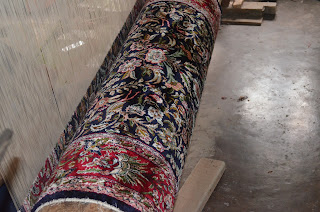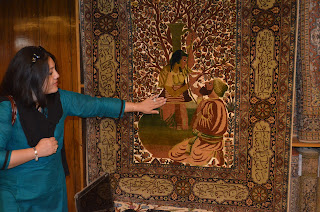Kashmir Carpets are known worldwide for their mesmerizing beauty and
excellent artistry. The exclusive handmade carpets ranging from superbly
crafted wool carpets to the high quality wool / silk blends and the epitome of
luxury, the pure silk Kashmir carpets are widely demanded all across the world.
Kashmir carpets are quite expensive though nowadays replica designs are also
available at cheaper rates. However, no replica designs can match up with the
original designs and Kashmiri carpets and rugs are a worthwhile lifelong
investment. These carpets reflect the beauty of the place itself. Today,
Kashmir carpet rugs especially those constructed from silk are the most sought
after floor covering items in the world.
Kashmiri Carpets Rugs Hand Knotted
Kashmir carpets are always handmade. Apart from being always handmade, a
noteworthy quality and feature of Kashmir carpets is that they are always
knotted and never tufted. The knots determine the durability and the strength
of the Carpet or Rug. Kashmir carpets are often woven either double knots or
and single knot. As compared to double knotted carpets, single knotted carpets
are fluffier. The double knotted carpet pile is less resistant to touch and
pressure.
Kashmiri Carpets Art
The carpet weaving craft did not originate in Kashmir. It is said that the carpet weaving technique and style have been acquired from Persia. The carpet weaving initially was very much influenced by the Persian designs, styles and patterns. However in the late seventeenth century, Indian style began to replace the Persian style, though most carpet designs, even today, reflect a Persian touch.
Yarns used in Kashmir Carpets and Rugs
The yarns used are either silk or wool or a combination of the two. Pile
is usually wool. While manufacturing woollen carpets, cotton is used as base;
silk carpets may have a cotton or silk base. As compared to woollen carpets,
silk carpets are expensive. Sometimes silk is used in the woollen carpets for
extra sheen. Woollen carpets are soft and make thinner folds. They are more
flexible and have the shine of the silk. The knots per square inches in these
carpets are high. Silk Kashmir carpets have a distinct sheen with velvety soft
touch.
Designs, Patterns, Colors in Kashmir Carpets
Carpet woven in Kashmir is a marvellous piece of art. If installed in
homes, these carpets lend their beauty to the whole environment. Carpets are
beautified by intricate patterns and marvellous designs. The most popular
design of these carpets is the tree of life. Designs are mainly floral or
zoological though geometrical motifs are also found. The designs are named
after Iranian city like Kashan, Kirman, Ardabil, Meshad, Qum, Faraghan, Hamadan
and so on. The colors of the Kashmir carpet distinguish it from the other carpets.
The carpet colors are more subtle and muted. Vegetable dyes are used for
coloring the yarn. All shades of red, green, yellow, blue are used
predominantly. All the carpets are quite unique in themselves. Each piece is
differentiated from others by their color-way and other details.
Kashmir Carpet Weaving Style
Carpet weaving technique used in Kashmir is called Talim. It is in fact
a blueprint of carpet weaving. It is paper that is covered with interminable
rows of twists, curves and hieroglyphs. After learning the design depicted on
the Talim for months, the actual manufacturing starts.
Buying Tips
If you want to buy Kashmir carpet it is necessary to keep in mind
certain things. As this carpet is very expensive and is one time investment, it
is must that you keep the following factors in your mind before purchasing
Kashmir carpets
·
Check carefully the material of the carpet. Take a close look to see
that the carpet you are purchasing has been made of silk pile on silk base,
silk pile on cotton base, silk and wool on cotton base or wool on cotton base.
·
You can enquire the knotting pattern just seeing the carpet from the
reverse side
·
Look the carpet carefully and enquire whether all the design has been
woven correctly
·
Also whether each motif or element of design has clear, crisp outlines
·
Also feel the edges with your hand to find out whether the edges are
smooth or not.
The loom has silk threads stretched across tightly through which the weaver weaves patterns.
A weaver at work..focus is the mantra
The patterns are first coded on a sheet of parchment.The weaver has to continuously refer to the code so as not to miss out a design.the designs are very well balanced and symmetrical.
Silk threads are imported from China
There are few coded patterns available.The weaver changes colour schemes to create novelty in designs.The codes are inherited from forefathers.
Mughal patterns are in great demand.
Peacock immortalized ..a dream is woven
Omar Khayyam with his goblet ..this pattern symbolizes his love for wine and woman..both intoxicating.
Geometrical pattern in tribal colours
Weaver of dreams..magic carpets.Perhaps Alladin had such a carpet that took him across continents.These carpets are magical in the sense that one sees different shades and hues from different angles.













This comment has been removed by the author.
ReplyDeleteThat carpets are dreamlike true :-)
DeleteThey truly are.and the way they are made is fascinating:)
DeleteVery nice and informative article.... Thanx for sharing...
ReplyDeletePlz remove word verification... so that other could comment easily..your blog is very nice..
ReplyDeleteThank you for appreciating my blog..i will try to remove the word verification as you suggest.:)
ReplyDeleteVery old rugs will feel gritty, sandy, or even smooth on the back. A fine rug that looks tightly woven, but that still feels somewhat floppy or supple, is probably old, since even tightly woven rugs become supple with time. Color or rug dye quality can also help determine how old a rug is.
ReplyDeletehandmade tree of life rugs for sale